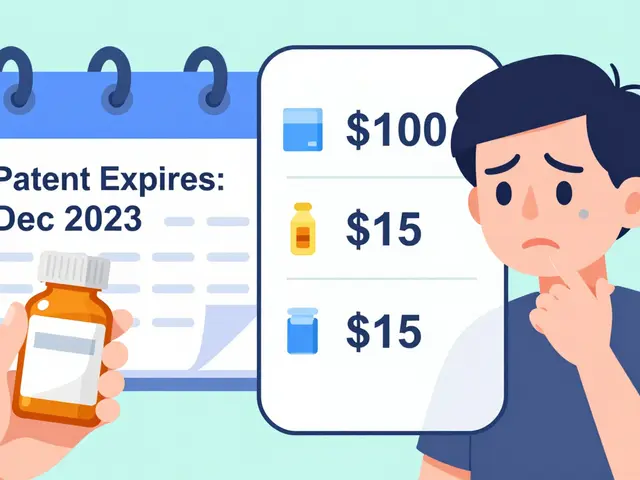
The ever-evolving world of digital healthcare has brought about an array of options for those seeking medical advice and services online. With the rise of platforms like Felixforyou.ca, individuals can now find healthcare solutions at their fingertips without the need for in-person visits. However, as the field grows, so does the pool of alternatives, each offering unique features tailored to different needs.
In this article, we'll explore eight standout alternatives to Felixforyou.ca, looking into various aspects such as accessibility, range of services, and specialized care. Whether you are seeking a comprehensive medical platform or a service focused on holistic wellness, there’s something available to fit every requirement. Dive into these options to find the one that resonates most with your health needs and preferences.
- Maple
- Tia Health
- Livewell
- Telus Health
- Wharton Medical Clinic
- PocketPills
- Jill Health
- Comparison Table
- Conclusion
Maple
Maple is among the most popular telemedicine platforms redefining how Canadians access healthcare. This revolutionary service allows you to connect with licensed medical practitioners around the clock. This platform offers convenience and efficiency that traditional in-person visits seldom deliver. Imagine waking up in the middle of the night with a pressing medical concern and finding a professional ready to help directly through your screen — that's the kind of accessibility Maple aims to provide.
The interface of Maple is a standout feature. It is designed to be intuitive, ensuring users can quickly navigate and book appointments without any hassle. Whether you are a tech-savvy millennial or someone who isn't fond of technology, Maple's user-friendly design allows everyone an equal opportunity to seek medical attention promptly. Additionally, you can browse through a plethora of specialists, ensuring your medical needs are met by the most suitable professional.
Maple boasts a network of over 1,000 healthcare professionals who are available at your fingertips, offering comprehensive care from urgent medical advice to ongoing health management. This is particularly beneficial for those in remote areas where healthcare accessibility might pose a challenge. Such extensive availability bridges the gap between urban and rural healthcare, accentuating Maple's commitment to universal health coverage.
"Maple is transforming healthcare in Canada by making medical care more accessible to those who need it," a well-known publication noted, highlighting its impact on medical accessibility and patient satisfaction.
Statistics back Maple's success; it has achieved an impressive milestone with over 1 million five-star reviews. This signifies trust and satisfaction from users who have benefited from Maple's services. The convenience of accessing medical consultations 24/7 not only caters to emergency situations but also routine health monitoring, a necessity for those managing chronic conditions. In fact, a specific study highlighted how the introduction of telemedicine platforms like Maple has led to a 35% increase in adherence to medical appointments, showcasing its role in promoting better health management.
From an economical perspective, while Maple's services might incur fees for those not covered by provincial health plans, the quality of care provided justifies the cost. Many users report significant time saving and reduced stress from traveling and waiting for physical consultations. Additionally, Maple's ability to digitally store medical records allows for seamless continuity of care, which is invaluable for patients undergoing complex treatments.
Pros
- Convenient 24/7 access
- Comprehensive medical services
- User-friendly interface
- Extensive network of healthcare professionals
- Excellent customer reviews
Cons
- Fees may apply for services not covered by provincial health plans
Tia Health
Tia Health has emerged as a dynamic player in the realm of telemedicine, offering rapid access to healthcare professionals for a host of medical needs. This platform emphasizes quick delivery of healthcare alternatives, aiming to bridge the often-notorious gap between need and care. It’s a service built for individuals seeking prompt resolution of their health concerns without the hassle of traditional waiting rooms. With its ability to connect patients to physicians, Tia Health has positioned itself as a leader in enhancing healthcare efficiency in Canada.
At Tia Health, the process begins with a simple online setup that allows users to swiftly book appointments with healthcare professionals. These appointments are designed not only to offer immediate health solutions but also to ensure that each patient understands their treatment path. The platform is particularly popular for handling prescription needs, cutting down the wait times that frequently accompany obtaining necessary medication. Whether it's a prescription refill or a first-time consultation, Tia Health offers a smooth transition from appointment to action. A user-centric interface further strengthens its appeal, making navigation intuitive for all age groups. For those wondering about integrating with existing healthcare plans, Tia Health also facilitates discussions around managing other forms of medical care.
This attention to detail and commitment to patient convenience make Tia Health a reliable digital consultation choice. While it showcases a robust capability in streamlining access, some users have noted a lack of extensive holistic or preventive care options, which could be an area to improve. Nevertheless, as access to healthcare continues to evolve, Tia Health serves as a viable option for those in need of fast, trustworthy, and efficient medical consultations in Canada.
The Canadian Medical Association Journal highlights, "Telemedicine platforms like Tia Health are revolutionizing access to healthcare, making it more efficient and patient-friendly."
While statistics about the current usage of such platforms aren't explicitly stated, anecdotal evidence showcases a steady increase in patient numbers. As digital healthcare becomes more pervasive, Tia Health's commitment to quick and efficient service continues to reaffirm its standing in the field. By focusing on optimizing the telemedicine platform experience, Tia Health remains an accessible option for Canadians looking to navigate their healthcare journey seamlessly.
Livewell
The world of telemedicine is vast, yet many platforms focus primarily on traditional, symptom-based approaches. Livewell stands apart by embracing a holistic approach that aims to treat the body, mind, and spirit as a cohesive unit. At the heart of Livewell’s philosophy is the belief in natural remedies and preventive care, which can often enhance well-being before issues arise. Livewell bridges the gap between conventional medicine and alternative approaches, offering Canadians an innovative solution for their healthcare needs. The emphasis on natural remedies means users have access to a variety of naturopathic treatments that can be tailored to individual lifestyles and preferences.
When you delve into Livewell, you'll find a diverse network of wellness professionals, including naturopaths and holistic nutritionists. This variety allows users to explore treatments that are not just reactive but proactive, focusing on maintaining health through balanced nutrition, lifestyle adjustments, and natural supplements. Users who prefer natural methods may appreciate the consultations available with professionals who share similar beliefs. The platform encourages lifestyle interventions that are sustainable and empowering, ensuring that patients adopt habits that can prevent ailments and chronic conditions in the long run. Moreover, for individuals inquisitive about alternative health practices, this platform serves as a valuable resource for learning and growth.
You don't only have to take our word for it. An insightful quote from a recent health industry report states,
"The focus on holistic health is increasingly gaining traction as consumers seek more natural and preventative solutions."Such perspectives are reshaping healthcare environments, encapsulating the rising demand for services like those offered by Livewell. The platform’s broad appeal is also reflected in its community-centric model, providing support networks and group workshops, which prove invaluable for participants. These interactions are designed to motivate and ensure accountability for users on their wellness journeys.
- Holistic health focus
- Natural remedies and preventive care
- Specialized services for those seeking alternative health approaches
Pros
- May not be suitable for all medical needs
- Limited scope compared to comprehensive medical platforms
Cons
| Feature | Detail |
|---|---|
| Access to Professionals | Naturopaths, holistic nutritionists |
| Focus | Natural remedies, preventive care |
By integrating comprehensive care with alternative methods, Livewell is forging a path for those eager to take charge of their health journey in a more natural and personalized way. Its contributions to the telemedicine landscape underscore the growing importance of choice and customized care in today’s healthcare climate. For anyone aiming to explore an approach that aligns with such ideals, Livewell presents a compelling option in the digital healthcare space.

Telus Health
Telus Health is a prominent player in the digital healthcare scene in Canada, offering a diverse range of services that cater to numerous medical needs. Known for its comprehensive care, this platform stands out due to its extensive coverage provided through provincial health plans. The hallmark of Telus Health is its accessibility and affordability, making it a popular choice for Canadians seeking both general and specialized medical support. This service connects patients to a wide network of healthcare professionals, ensuring that users have access to the care they need without the stress of high fees that often accompany private healthcare services. With technology at its core, Telus Health enables secure and efficient virtual consultations, which have become increasingly vital in today's fast-paced world.
In terms of practical benefits, Telus Health users enjoy the convenience of scheduling appointments online, reducing the hassle traditionally associated with seeing a doctor. The platform’s intuitive design makes it easier for patients to navigate through their healthcare options, manage appointments, and access records with ease. Moreover, Telus Health offers healthcare services that range from general consultations to specific needs such as mental health support, chronic disease management, and nutrition counseling. Such a wide array ensures that the individual needs of each patient can be met through one platform. This alignment with various facets of healthcare is a step towards a more integrated approach, promoting better health outcomes across populations.
Pros
- Comprehensive care covered by provincial health plans.
- Wide network of healthcare professionals available for consultations.
- Accessible and user-friendly platform for scheduling and managing healthcare needs.
- Diverse range of services catering to general and specialized healthcare requirements.
Cons
- Additional fees might be required for services not covered by provincial plans.
According to a report by eHealth Canada, "Platforms like Telus Health are reshaping the healthcare landscape by providing comprehensive coverage and integrating technology into patient care, setting a precedent for other services."
Another pivotal advantage is how Telus Health effectively bridges the gap between traditional healthcare services and modern digital transformations. By investing in digital infrastructure, Telus Health ensures that healthcare is not just a privilege for urban residents but also attainable for rural communities, who often face challenges in accessing quality medical services. This focus on inclusivity through technology not only benefits individuals but also contributes to overall public health standards. Statistically, users report higher satisfaction rates and improved health management outcomes, attributed to the convenience and reliability of digital healthcare environments like Telus Health. For prospective users evaluating their telemedicine options, such extensive service makes Telus Health a compelling choice, worthy of consideration amid a landscape of emerging and established alternatives.
Wharton Medical Clinic
Wharton Medical Clinic is a significant name in the realm of specialized healthcare, especially for those grappling with weight-related concerns. Recognized for its dedicated approach to weight management programs, the clinic operates with a keen understanding that weight issues can profoundly impact both physical and mental health. At Wharton, the focus extends beyond just managing weight; it addresses the root causes, providing patients with a holistic and supportive environment aimed at long-term success.
The clinic's programs are meticulously designed to cater to individual needs, acknowledging the unique journeys each patient undergoes. These programs offer extensive resources and support systems, including detailed nutritional guidance, behavioral counseling, and the necessary medical oversight to ensure healthy progress. This integrated approach empowers individuals by equipping them with the tools required to make sustainable lifestyle changes. The emphasis on accessibility also means the clinic remains open to patients throughout various stages of their weight management journey.
Comprehensive Care and Expertise
At the heart of Wharton Medical Clinic's success is its team of highly specialized medical professionals who are not just experts in their respective fields, but also compassionate caregivers. The professionals here understand the challenges and stigma often associated with obesity, tailoring their approaches to be empathetic and constructive. This professionalism, paired with cutting-edge technology and practices, positions Wharton as a leader in its sector.
Interesting statistics from recent studies highlight that clinics like Wharton play a vital role in managing obesity, which affects approximately 1 in 4 Canadians. This underscores the importance of accessible weight-related healthcare solutions. By focusing on education alongside treatment, Wharton is not just addressing the condition but actively participating in broader public health improvements.
"The personalized care at Wharton Medical Clinic offers a light at the end of the tunnel for many dealing with weight issues," says Dr. Jane Robinson, a respected figure in medical nutrition therapy.
While its role in weight management is significant, it is essential to recognize the clinic's limitations. For instance, those seeking a wider array of medical services may find Wharton's scope narrower than comprehensive medical platforms. Nevertheless, for its strategic focus, Wharton is invaluable, offering much-needed specialized services for a demanding health issue.
PocketPills
In the realm of digital healthcare solutions, PocketPills stands out as an innovative digital pharmacy service that has transformed how Canadians receive their medications. This platform reimagines traditional pharmacy experiences by providing online access, seamless medication management, and a delivery system designed to cater to diverse needs across the nation. Established with the vision of bridging gaps between patients and their prescriptions, PocketPills aims to offer a hassle-free experience to those with limited mobility, hectic schedules, or remote living situations.
PocketPills utilizes cutting-edge technology to ensure that every aspect of the pharmacy service is accessible and user-friendly. By allowing users to manage their prescriptions online, this platform minimizes the need for frequent pharmacy visits, which can be a significant advantage for those living with physical disabilities or in rural communities where healthcare resources are not as readily available. The service prides itself on its efficiency, providing a unique system where patients can receive their medications directly at their doorstep, often with same-day or next-day delivery options.
A key feature of PocketPills is its focus on personalized care. The platform ensures that users have access to pharmacists who are available for consultations, helping users understand their medications' implications, side effects, and possible interactions with other drugs. This level of personalized attention is akin to visiting a pharmacy but happens in the comfort of one’s home. Not only does this provide convenience, it also encourages a more informed approach to medication management, which is vital in an era where polypharmacy—taking multiple medications—is common among many patients. PocketPills supports medication adherence, which is crucial for the effectiveness of treatments across chronic conditions.
Digital consultations are another cornerstone of PocketPills' offerings. These consultations are designed to ensure that patients receive consistent and informed healthcare support. Although the service primarily focuses on pharmacy needs, the integration of digital consultations bridges a crucial gap, providing users with professional advice right when it's needed. This integration is particularly beneficial during urgent situations where guidance on medication is necessary without delay.
Pros
- Accessible medication delivery service, regardless of geographical location.
- User-friendly platform for managing prescriptions online.
- Personalized pharmacist consultations available to assist with medication management.
- Efficient and reliable delivery options, including same-day and next-day services.
Cons
- Primarily focused on pharmacy services, which might not cater to broader healthcare needs.
- Limited in preventing or diagnosing medical conditions due to its pharmacy-centered approach.
With its emphasis on efficient, reliable, and accessible healthcare solutions, PocketPills has positioned itself as a leader in the digital pharmacy sector in Canada. It illustrates the growing trend towards integrating technology with traditional healthcare practices, promoting a future where healthcare can be as personalized and convenient as your next food delivery.

Jill Health
Jill Health is a fascinating fusion of digital pharmacy and healthcare services, offering a seamless blend of medication management and online consultations right at your fingertips. In the ever-growing realm of digital health, Jill Health stands out for its innovative approach to telemedicine platforms by providing essential access to prescriptions while bridging gaps in the healthcare system. This service paves the way for individuals who wish to avoid the traditional and often time-consuming visits to physical pharmacies.
One of the biggest advantages of using Jill Health is its ability to integrate both traditional and modern healthcare solutions. Imagine logging into an app where you can consult healthcare professionals and order your prescriptions all at once. This convenience is groundbreaking because it tackles two prevalent issues faced by many in the healthcare system: accessibility and complexity. Not only does this save time, but it also ensures that those who may face mobility challenges or geographical barriers have equitable access to necessary medications and consultations.
Jill Health is reputed for reducing administrative burdens on patients, which is often cited as a major obstacle in healthcare delivery. It addresses the looming issue of medication adherence by ensuring that patients are reminded and kept up-to-date with their prescriptions. In many cases, medication non-adherence is linked to preventable complications, and by addressing this, Jill Health potentially saves both time and resources for healthcare providers and patients alike.
According to a study by Deloitte, "Digital health solutions like telemedicine have the potential to expand health services to underserved populations while making the healthcare system more efficient." The integration of digital platforms like Jill Health's service becomes obviously beneficial as it aligns with these findings, pushing towards more inclusive healthcare practices.
While Jill Health primarily focuses on pharmacy needs, it doesn't stop there. Its service model ensures that users have access to professional guidance through consultations. Although the platform may not extensively cover all medical services, it excels in what it offers—quick and efficient pharmacy support backed by professional health advice. For those who need regular medications, Jill Health's service could bring peace of mind, knowing their healthcare continuity is managed in an organized and accessible manner.
Users of Jill Health have often expressed satisfaction with the platform's ease of use and efficiency. In the words of one satisfied user, "It's like having a pharmacy and clinic rolled into one, minus the long waits and complex processes." Such testimonials underscore its role in redefining how people interact with healthcare providers from their own homes. As digital consultations become increasingly favored, especially amid global shifts towards remote solutions, platforms like Jill Health undoubtedly have a significant place in this new era of healthcare.
Comparison Table
In a world increasingly driven by technology, the notion of visiting a doctor has transformed significantly. True to the new-age spirit, telemedicine platforms have redefined healthcare delivery, offering an alternative to the traditional clinic. The multitude of telemedicine platforms now available in Canada presents a variety of choices for those seeking convenience and quality in their healthcare services. Whether you are drawn to the instant accessibility of platforms like Maple, or the natural remedy approach of Livewell, understanding the distinct features of each option is crucial.
Examining the alternatives, we can notice some common threads woven throughout these platforms: user-friendly interfaces, direct access to healthcare professionals, and a greater embrace of digital healthcare. However, it is their unique offerings that set them apart. Maple, with its 24/7 availability, appeals to individuals who prioritize immediate access to medical consultations. On the other hand, services like Tia Health stand out for their expedited prescription delivery, demonstrating a focus on streamlined pharmaceutical care. These platforms not only symbolize healthcare accessibility, but they also reflect a critical shift in patient priority towards on-demand service provisions.
To aid in your decision-making process, here’s a comprehensible breakdown of the top contenders:
| Platform | Key Feature | Pros | Cons |
|---|---|---|---|
| Maple | 24/7 access, licensed professionals |
|
|
| Tia Health | Quick prescription access |
|
|
| Livewell | Holistic health focus |
|
|
| Telus Health | Comprehensive care |
|
|
The rise of these platforms reflects a deeper trend: the digitization of healthcare services. The inclusivity that these platforms offer, extending services to both urban and rural communities, is a testament to the potential of technology in bridging healthcare gaps. An insightful remark by Dr. Sarah Johnson, a noted expert in healthcare technology, perfectly encapsulates this sentiment:
"The future of healthcare lies not only in its ability to innovate but in its capacity to reach and resonate with every individual irrespective of geographical boundaries."With each of these telemedicine platforms, Canadians have a unique opportunity to tailor their healthcare experiences to fit their personal preferences and lifestyles, emphasizing the changing landscape of digital consultations in the modern era.
Conclusion
As we navigate through the digital revolution in health care, the emergence of telemedicine platforms offers invaluable flexibility and convenience. Each alternative to Felixforyou.ca we've explored brings its unique strengths and features to the table. Whether it’s the comprehensive telemedicine platforms like Maple with its vast network of licensed professionals available 24/7 or the holistic approach of Livewell focusing on natural and preventive measures, there's a service to fit every individual health need and lifestyle.
There are several factors to consider when choosing the right platform. Accessibility, range of services, and personal health priorities all play crucial roles. For instance, those living in rural areas may prioritize platforms offering extensive remote access like Tia Health, which promises quick prescription services. Others might lean towards Livewell for its dedication to holistic wellness therapies. It's interesting to note that according to a study by the Canadian Institute for Health Information, about 70% of Canadian patients expressed satisfaction with online consultations, reflecting a growing acceptance of digital healthcare solutions.
The variety of available services also emphasizes the need for telemedicine to cater to diverse health issues. While platforms like Wharton Medical Clinic specialize in weight management, PocketPills stands out with its seamless digital pharmacy services, bridging the gap between prescriptions and delivery effectively. This diversity ensures that users are not only receiving treatment but also experiencing a model of care that integrates modern convenience with personalized attention.
To summarize the alternatives, here's a quick overview to help you navigate the plethora of options:
| Platform | Specialization | Notable Features |
|---|---|---|
| Maple | Comprehensive Care | 24/7 Access, Extensive Doctor Network |
| Tia Health | Speedy Consultations | Quick Prescriptions |
| Livewell | Holistic Wellness | Natural Remedies Focus |
| Telus Health | Cost-Effective | Covered by Provincial Plans |
| Wharton Medical Clinic | Weight Management | Specialized Programs |
| PocketPills | Digital Pharmacy | Efficient Delivery |
| Jill Health | Pharmacy/Consultation Integration | Seamless Service |
In this rapidly evolving field, it's essential to stay informed about the latest advancements and options available. As consumer demand and technological innovation continue to drive the landscape of telemedicine, these platforms are well-positioned to meet the growing needs of modern healthcare. Choosing the right service depends on understanding your healthcare priorities and matching them with the right features offered by these outstanding platforms. As healthcare continues to integrate more with the digital world, users can look forward to even more personalized and accessible solutions.




Tim Giles
December 12, 2024 AT 10:45This post is a very timely and informative piece regarding telemedicine platforms. I find it fascinating how health services are rapidly transitioning online, particularly after recent global events. Can you elaborate on how the privacy concerns are being handled on these platforms? I'm sure many users might be apprehensive about sharing sensitive personal information through digital means. What measures are these platforms taking to ensure confidentiality and data security for their clients?
Peter Jones
December 12, 2024 AT 10:46Totally agree that exploring alternatives to Felixforyou.ca is a great idea! It's wild how many options we've got these days. I personally would love to know about any experiences anyone has had with platforms like Maple or Livewell. Do they really provide the same quality of service as in-person visits? Also, have you found any major differences in pricing and coverage compared to traditional healthcare routes?
Gerard Parker
December 12, 2024 AT 10:49Great heads-up about the changing landscape of telemedicine! I must say, though, that while it offers convenience, I wonder if the quality of care is compromised at all. How do virtual consultations hold up against face-to-face appointments? Moreover, are there specific demographics that are more inclined to use telemedicine? Just curious about the overall effectiveness and who benefits the most from these platforms.
Thomas Burke
December 12, 2024 AT 10:51I resonate with the points made here! The future of healthcare seems to be integrated with technology, but it's essential to consider its implications carefully. I would recommend someone to always check if these platforms are covered by your insurance; it can change the game when deciding which service to use. Also, in terms of accessibility, do these platforms cater to people with disabilities? There might be gaps that need addressing to ensure everyone can have access.
Debbie Frapp
December 12, 2024 AT 10:56What an interesting discussion! I think one aspect we shouldn't overlook is the human element of healthcare. Telemedicine can feel so impersonal at times. I wonder how providers are navigating building rapport with patients in virtual settings. Has anyone here had a positive experience in that regard? It would be great to hear personal stories about telemedicine interactions!
Michelle Abbott
December 12, 2024 AT 11:00As someone who has used telemedicine services, I find this post very relevant. The shift towards these platforms has indeed been accelerated. However, the verbiage used to market them can be misleading at times. Terms like 'holistic' and 'comprehensive' can mean different things to different people. I think it's essential to dive deeper into what each platform truly offers rather than just scratching the surface. Anyone here had a 'holistic' experience that felt genuine or perhaps felt tricked?
Heather Jackson
December 12, 2024 AT 11:04This entire concept of telemedicine has a lot of layers to unpack, doesn't it? I read somewhere that accessibility is one of the critical figures we need to assess. Are there populations that are still left behind with these platforms? When considering options like Maple or Livewell, I think having some statistics on user demographics would be beneficial. If we're truly aiming for inclusive healthcare, let's see those numbers!
Akshay Pure
December 12, 2024 AT 11:06While I appreciate alternatives, my primary concern remains with the effectiveness of these platforms! Some might assume that telemedicine can substitute traditional appointments entirely. Has anyone done a comparative study on health outcomes from both? It seems crucial for people to be informed about this before they make an extensive switch! Sometimes I believe the tech-savvy audience may overlook these significant aspects when choosing telemedicine.
Steven Macy
December 12, 2024 AT 11:09This is really just the beginning of what telemedicine can potentially offer. I'm intrigued by how the technology is evolving too; artificial intelligence is becoming increasingly involved in patient care. Can you imagine having a chat with AI for simple consultations? It could save so much time. However, how do we ensure that quality doesn't slip in this evolution? That's one fear I think a lot of people have.
Matt Stone
December 12, 2024 AT 11:11I'm super skeptical of these platforms. Sure, they provide access, but at what cost to personal engagement? I've heard far too many stories of doctors misdiagnosing patients during online visits because they couldn't see the entire picture like they can in person. Have there been any studies released on the accuracy of these diagnoses? This is a critical factor that needs to be addressed if telemedicine will become a long-term solution for healthcare!
Joy Luca
December 12, 2024 AT 11:14All these discussions are absolutely spot on! While telemedicine serves as a beacon for many, it poses some questions about quality and care standards. Additionally, I think bridging the generational gap will be pivotal. Younger generations seem to be adapting quickly, but older adults might struggle. Taking time to educate people on how to navigate these platforms could be a game changer. I'd love to hear if others have tips or resources that helped.
Jessica Martins
December 12, 2024 AT 11:16This is all very interesting. What about the legal framework surrounding telemedicine? I bet most people don't realize how much the laws vary by jurisdiction. Can patients in one state receive care from a provider in another state? That variability might complicate the choice of platform. It's crucial we shine a light on the regulatory issues that might be affecting these services.
Doug Farley
December 12, 2024 AT 11:19Honestly, this post has opened up a lot of questions for me! I mean, while the convenience of platforms like Maple is compelling, I can't help but question the quality of the care offered remotely. Isn't the personal touch key in medicine? The notion that a doctor can effectively diagnose and treat someone through a screen feels a bit off to me. What has been your experience using these services?
Jeremy Olson
December 12, 2024 AT 11:21The topic raised here is really vital, especially considering the current climate and the growing acceptance of telemedicine. I would love to see some data on patient satisfaction rates across various platforms. It's clear that while many users are satisfied, there are those who are not. What challenges have companies faced in retaining client trust? It's crucial that these platforms not only provide services but also instill confidence.
Ada Lusardi
December 12, 2024 AT 11:24As someone who dabbles in physical therapy, I wonder how telemedicine is bridging physical and holistic health services. For things that require hands-on treatment, can they effectively integrate guidance and physical help via video? I feel like some healthcare services can’t replace the human touch, and that’s something many people might miss out on. What are potential innovations to ensure quality care while sticking to a virtual model?
Pam Mickelson
December 12, 2024 AT 11:26Before diving too deep into this, have we considered the technology access aspect? Not everyone has consistent internet or even devices capable of participating in telemedicine. That can create a massive divide when providing access to health services. Is there any push for companies to address these inequalities while expanding their services? Everyone deserves quality healthcare, not just those who can afford the tech! This conversation has been enlightening!
Joe V
December 12, 2024 AT 11:29Sometimes it feels as if we are rushing headlong into this technological shift without fully understanding its repercussions. Telemedicine is not just a simple replacement for in-person visits - it presents a whole new world of challenges, including insurance issues and patient follow-up care. Are these platforms prepared to handle the demands of continuity in care? If they don't have robust systems, that could pose significant risks to patient outcomes!
Scott Davis
December 12, 2024 AT 11:31This post has so many important points! I'm keen on knowing how customer support plays a role in these telemedicine platforms. It’s essential for users to feel they have support at their fingertips. Telemedicine can be daunting, and having a dedicated team for addressing those questions could dramatically influence overall patient satisfaction. Has anyone experienced the customer support of these platforms, and how was it?
Calvin Smith
December 12, 2024 AT 11:34While I'm intrigued by the advantages of telemedicine highlighted in the post, I remain pretty concerned about the long-term implications. This approach could lead to a significant shift in how medical professionals interact with patients, and not all change is progress. Will doctors increasingly lose the ability to create strong patient relations? I'm interested in thoughts on how telemedicine can enhance rather than diminish the doctor-patient dynamic.
Brenda Hampton
December 12, 2024 AT 11:36This discussion is really eye-opening! I think we all can agree that while telemedicine offers convenience, it’s imperative to tread carefully so we don’t lose sight of quality care. Being able to research different platforms before deciding is key. It’s also essential to actively hold these platforms accountable. If we advocate for better practices and patient rights, we can indeed enjoy the benefits while minimizing the risks. I’d love to hear more experiences shared in this thread, folks!